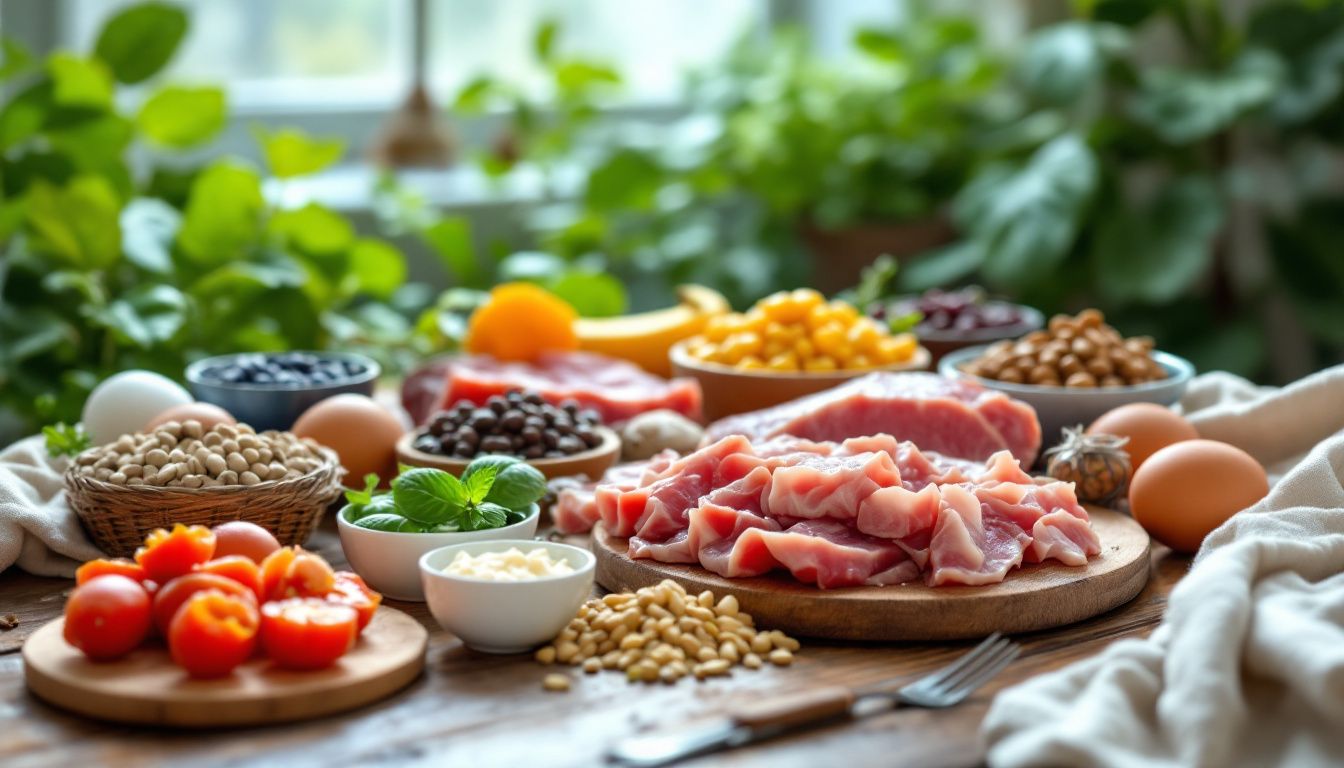Building muscle can feel tricky without the right foods. Protein helps repair and grow your muscles after resistance training. This blog will show you the best high-protein foods to add to your diet for muscle growth and weight loss.
Thank you for reading this post, don't forget to subscribe!Keep reading—you’ll find simple tips for better results!
Key Takeaways
- High-protein foods like eggs, chicken breast, salmon, and quinoa help build muscle by repairing and growing muscle fibers after resistance training.
- Experts recommend 1.42 grams of protein per kilogram of body weight daily for effective muscle building.
- Plant-based proteins like tofu, lentils, chickpeas, and edamame are great options for vegetarians or vegans aiming to gain strength.
- Combining foods like meat with grains or dairy with seeds ensures a complete amino acid profile essential for muscle growth.
- Avoid processed meats, sugary snacks, fried foods, and alcohol as they slow recovery and hurt your health goals.
Importance of Protein in Muscle Building
Protein repairs damaged muscle fibers after workouts. Resistance training and strength exercises create tiny tears in muscles. Eating enough protein helps rebuild these tears, making muscles stronger and bigger.
Experts suggest about 1.42 grams of dietary protein per kilogram of body weight daily for best results.
Amino acids, found in high-protein foods, are the building blocks of muscle tissue. Essential amino acids must come from food since the body doesn’t make them. Greek yogurt, chicken breast, cottage cheese, and lean beef provide complete proteins with all essential amino acids needed for growth.
For vegetarians or vegans, quinoa or soy protein can supply plant-based alternatives to animal products while supporting muscle mass gains effectively.
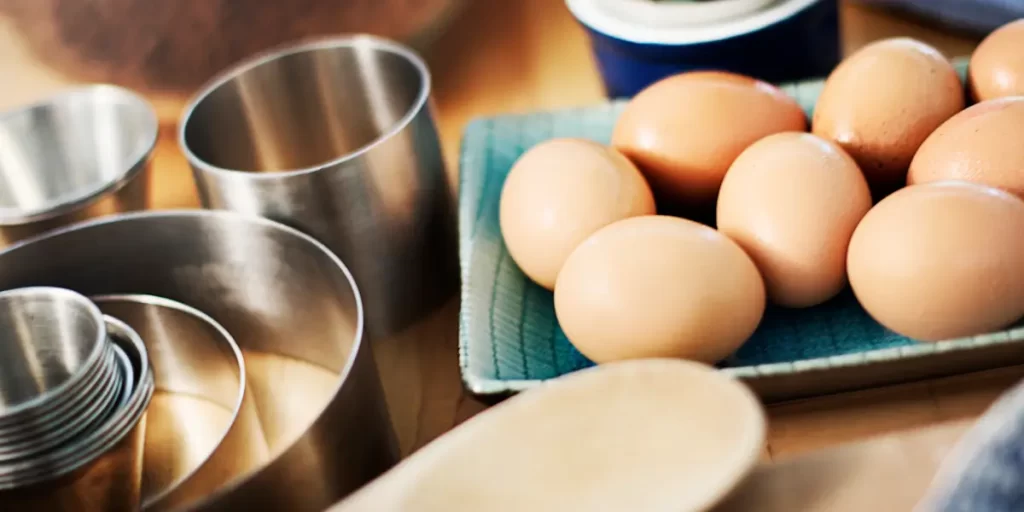
Top High-Protein Foods for Muscle Gain
Building muscle needs the right foods. Protein-rich options like meats, dairy, and grains provide energy and support recovery after workouts.
Eggs
Eggs pack 6 grams of high-quality protein in each serving. They are rich in leucine, an essential amino acid that helps muscle growth and repair. Adding eggs to your diet boosts protein synthesis after strength training or resistance workouts.
They also provide omega-3 fatty acids, vitamin D, and healthy fats for overall health. Versatile and quick to cook—boiled, scrambled, or poached—eggs make a perfect post-workout meal or snack.
Greek yogurt
Greek yogurt packs a punch of protein, offering 12-18 grams per 5-ounce serving. It combines whey and casein proteins, which digest at different speeds. This makes it excellent for muscle-building and recovery after exercise.
Pairing Greek yogurt with fruits or whole grains boosts your post-workout nutrition by adding healthy carbs.
Its creamy texture is not just delicious but versatile too. Use it as a base for smoothies, dips, or salad dressings to sneak in more protein daily. Compared to regular yogurt, it has twice the protein—perfect if you’re aiming to build muscle mass while sticking to high-protein foods!
Chicken breast
Chicken breast is a powerhouse for protein lovers. A 3-ounce serving (85 grams) packs about 26.7 grams of protein, making it perfect for muscle building. This lean meat supports your body during resistance training and helps you hit your recommended dietary allowance (RDA) for protein.
Low in saturated fats but rich in nutrients, chicken breast aids in gaining healthy muscle mass. It’s great for those aiming to create a calorie surplus while staying health-conscious.
Grilling or baking are smart cooking options to keep the nutritional value intact without adding extra fats.
Salmon
Salmon is a powerhouse for building muscle. A 3-ounce serving provides about 17 grams of protein and 1.5 grams of omega-3 fatty acids. These healthy fats support muscle growth and repair while reducing inflammation from resistance training.
It’s packed with B vitamins, which improve energy levels and help muscles function properly. Consuming salmon regularly can boost your daily intake of essential nutrients like amino acids and omega-3s—both vital for growing strong muscles.
Aim for at least two servings per week to support your balanced diet.
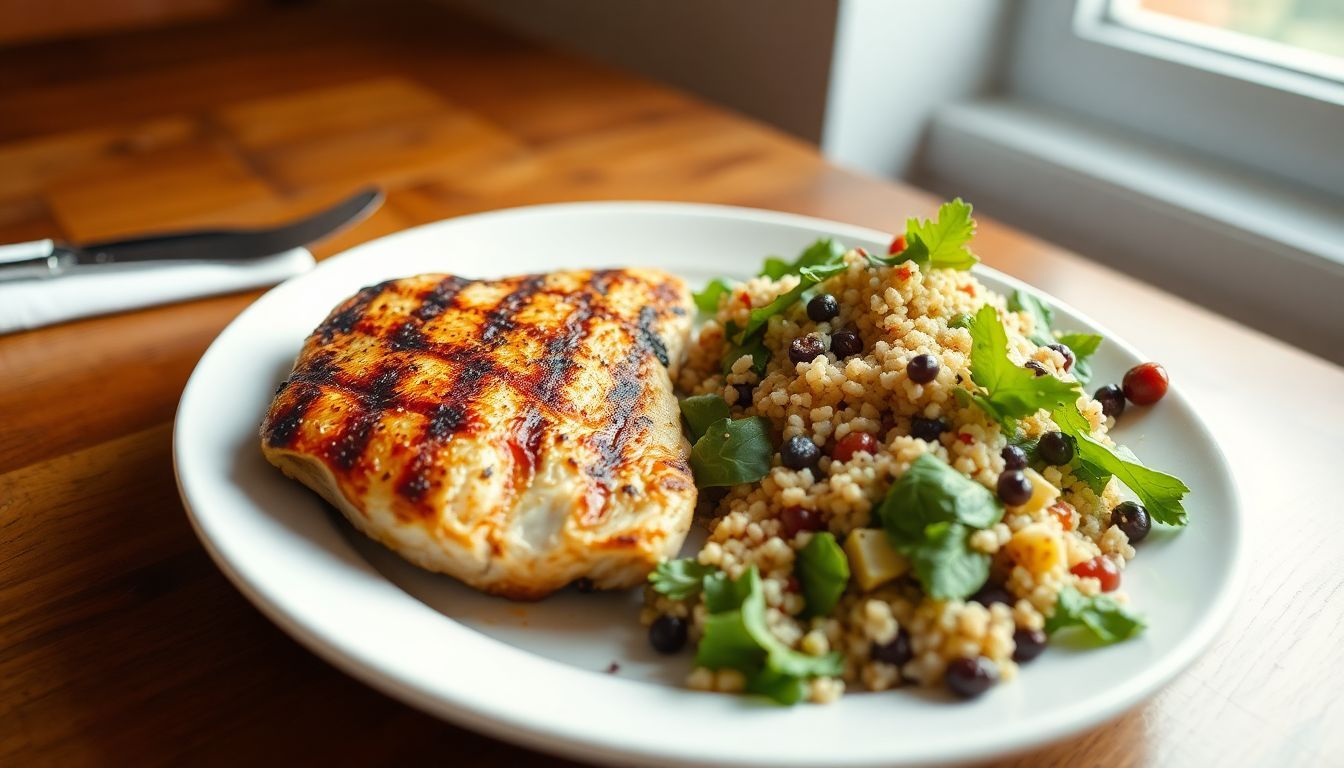
Lean beef
Lean beef packs over 23 grams of protein in just a 4-ounce serving. This makes it perfect for building muscle and boosting strength. It’s rich in B vitamins, iron, zinc, and creatine—key nutrients for energy and recovery after resistance training.
Adding lean beef to your diet supports muscle growth while keeping fat intake low. It fits well into a calorie surplus plan aimed at gaining lean muscle mass. Pair it with whole grains or vegetables like brown rice or broccoli for balanced meals that fuel workouts effectively.
Tofu
Tofu offers a strong plant-based protein option. Just 3 ounces provide about 12 grams of protein, making it a great choice for muscle building. A raw serving (124g) includes 10g of protein along with healthy fats and carbs.
It’s packed with essential amino acids that help repair muscles after resistance training.
This versatile food fits vegan and vegetarian diets easily. Tofu is also rich in calcium, supporting bone health and muscle function during workouts. Use firm tofu in stir-fries, soups, or as grilled slabs for meals full of vitamins and minerals without relying on red meat or processed options.
Quinoa
Tofu is a popular plant-based protein, but quinoa offers unique benefits too. This tiny grain-like seed provides all nine essential amino acids, making it a complete protein. One cup of cooked quinoa packs about 8 grams of protein and 5 grams of fiber.
It’s gluten-free, so it’s great for those with gluten sensitivities.
Quinoa also supports muscle building in other ways. It contains magnesium and phosphorus, which help with nerve and muscle function. Its high fiber content promotes satiety, aiding weight management while fueling your workouts.
A balanced diet with this nutrient-rich food can improve muscle growth and overall health.
Cottage cheese
Cottage cheese packs 28 grams of protein in one cup, making it a great choice for muscle growth. It is full of leucine, which helps build and repair muscles after workouts. Its high protein content supports recovery and boosts muscle mass when paired with resistance training.
Low-fat cottage cheese has fewer calories but still delivers plenty of benefits. This makes it ideal for those aiming to gain lean muscle or lose weight while staying on track with their diet.
Pair it with other foods like pumpkin seeds or whole grains for a balanced meal!
Plant-Based Protein Sources
Plant-based protein is a great option for those who don’t eat meat or want variety. These foods can help build muscle, improve health, and support a balanced diet.
Lentils
Lentils hold 9 grams of protein per half cup, making them a great option for muscle growth. They’re also rich in fiber, vitamins, and minerals. Their balance of carbohydrates provides energy for workouts while supporting muscle recovery—key for building strength.
Pair lentils with whole grains like brown rice to improve their amino acid profile. This creates a more complete protein source for better results. Lentils work well in soups, salads, or as a side dish, adding variety to any high-protein diet focused on lean muscle gain.
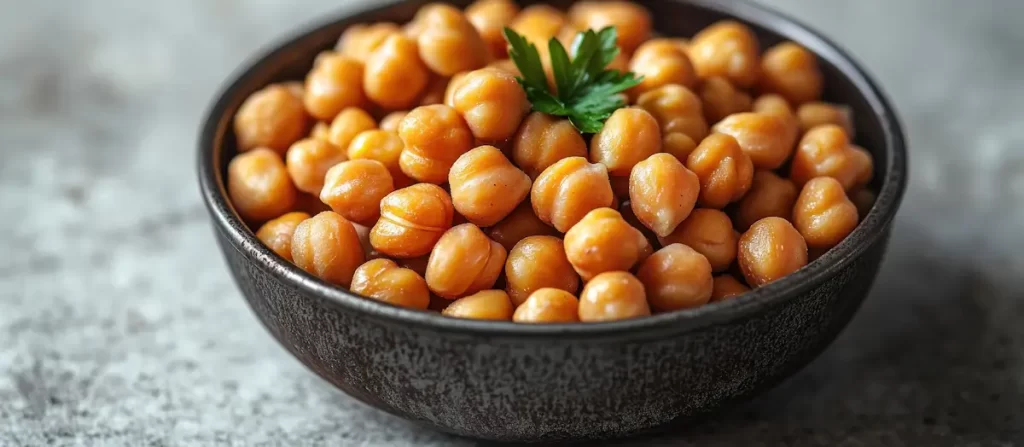
Chickpeas
Chickpeas pack 14.6 to 15 grams of protein per cup, making them great for a plant-based diet. They also include essential amino acids that help with muscle recovery and energy after workouts.
You can eat them in many ways—hummus, roasted snacks, or in stews. Pairing chickpeas with foods like quinoa or whole grains creates complete proteins, boosting their muscle-building benefits.
Beans
Beans offer about 15 grams of protein in a cooked cup, making them a great plant-based choice. They also provide fiber, B vitamins, magnesium, phosphorus, and iron—key nutrients for muscle building and recovery.
While not complete proteins like animal sources, beans help with energy and post-workout repair.
Their carbohydrates fuel exercise and muscle growth effectively. Black beans or kidney beans can work well in meals for lean mass gains. Beans are affordable too—easy to add to soups, salads, or tacos while boosting your protein intake without breaking the bank.
Edamame
Edamame packs about 18 grams of protein and 8 grams of fiber in just one cup. It is a smart choice for muscle building, loaded with folate, vitamin K, and manganese. These nutrients help support muscle growth and overall health.
You can enjoy edamame as a high-protein snack or add it to meals like stir-fries. Pairing it with other plant-based proteins, such as quinoa or beans, creates a complete amino acid profile.
This balance is vital for maintaining muscle mass during resistance training.
Almonds
Almonds pack a punch with 6 grams of protein per ounce. They offer fiber for fullness and B vitamins for energy during resistance training. These nuts also provide vitamin E, supporting muscle recovery and tissue repair.
Pair almonds with brown rice or beans to create complete proteins in plant-based diets. Snack on them raw, roasted, or blend them into smoothies for a high-protein boost.
Brown rice
Almonds aren’t the only plant-based protein powerhouse. Brown rice adds value to muscle-building diets with 5.32 grams of protein in just one cooked cup. It’s a great choice for those following a plant-based lifestyle and looking to boost their daily protein intake.
Pairing brown rice with beans or lentils creates complete proteins, covering all essential amino acids your body needs after resistance training. This simple combination supports muscle growth while keeping meals hearty and satisfying.
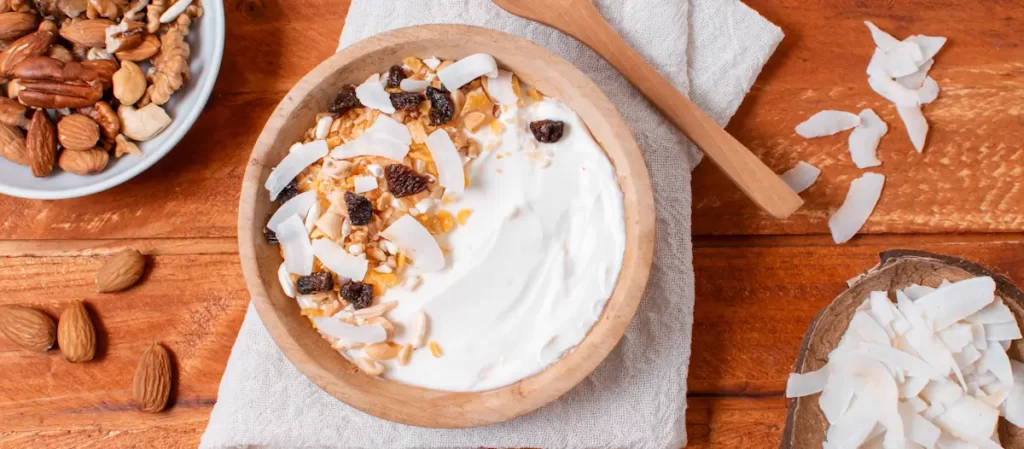
High-Protein Snacks: Best Choices for Muscle Growth and Satiety
High-protein snacks help build muscle and keep you full. They are easy to add to your day for extra nutrition.
- Nuts
Nuts like almonds or sunflower seeds are rich in protein and healthy fats. They are portable and provide energy for resistance training. - Greek Yogurt
This creamy snack is packed with protein and essential amino acids. It is great with chia seeds or a drizzle of honey for flavor. - Eggs
Hard-boiled eggs make the perfect snack for muscle growth. They contain all the essential amino acids your body needs. - Protein Bars
Protein bars offer a convenient way to boost protein intake on busy days. Look for ones low in sugar but high in whey protein or soy protein. - Cottage Cheese
Cottage cheese delivers casein, a slow-digesting protein that supports muscle recovery overnight. Add some pumpkin seeds or black beans for variety. - Beef Jerky
Lean beef jerky is high in protein, portable, and satisfying. Be cautious of brands with added saturated fats or too much sodium. - Edamame
These young soybeans are plant-based and packed with complete proteins. Steam them lightly and sprinkle some sea salt on top. - Peanut Butter on Whole Grain Bread
This combo provides a mix of plant-based protein, fiber, and b vitamins from whole grains—perfect before workouts. - Cheddar Cheese Slices
Cheddar cheese slices are rich in animal protein and calcium. Pair them with turkey breast slices for more flavor and nutrients. - Protein Shakes
A shake made with whey protein powder or soy milk can quickly meet daily recommended dietary allowance (RDA) levels post-workout!
Combining Foods for Optimal Protein Intake
Pairing different foods can boost protein quality. Combining items with complementary nutrients ensures you get all essential amino acids for muscle growth.
Meat and grains
Combining lean meats like chicken breast or turkey with whole grains such as brown rice creates a meal full of complete proteins. Complete proteins provide all nine essential amino acids, which help repair and grow muscle mass after resistance training.
Grains offer energy from carbs, while meat gives high-quality protein and B vitamins. For example, grilled salmon paired with quinoa provides omega-3 fatty acids and sustained energy—perfect for muscle building and recovery.
Dairy and seeds
Dairy like Greek yogurt and cottage cheese provides a rich source of protein. They contain essential amino acids that help repair and build muscle after workouts. Cottage cheese is high in casein protein, which digests slowly, making it great for nighttime recovery.
Greek yogurt offers both protein and gut-friendly probiotics.
Seeds, such as chia seeds or pumpkin seeds, pack plant-based protein along with fiber and healthy fats. These seeds also provide vital nutrients like vitamin E and magnesium, supporting muscle function.
Pairing dairy with seeds can boost your meal’s total nutrition by enhancing the amino acid profile—a smart choice for building muscle mass effectively.
Legumes and nuts
Dairy paired with seeds gives complete protein, but legumes and nuts also add variety. Soybeans, like edamame or tofu, pack protein and healthy unsaturated fats. They even provide essential amino acids needed for muscle building.
Chickpeas offer B vitamins, fiber, and plant-based protein to boost energy during resistance training. Peanuts deliver a punch of protein too but eat them in moderation—they’re calorie-dense.
Mixing different legumes with nuts improves nutritional intake and builds muscle mass effectively.
Foods to Limit or Avoid for Muscle Building
Some foods can hurt your muscle-building goals. They slow progress, add empty calories, or harm your health.
- Alcohol
Drinking alcohol can reduce muscle recovery and protein synthesis. It also dehydrates the body, weakening performance. - Processed Meats
Foods like bacon, sausage, and salami contain high levels of saturated fats and sodium. They may contribute to cardiovascular disease and inflammation. - Sugary Snacks and Drinks
Candy bars, sodas, and sugary cereals offer no nutrients for muscle growth. The sugar spikes energy briefly but leads to crashes later. - Deep-Fried Foods
Fried chicken or French fries are loaded with unhealthy fats that may hinder muscle repair. These items also increase calorie intake without useful nutrition. - Ultra-Processed Foods
Instant noodles or frozen pizzas lack essential amino acids needed for building muscle mass. They often feature refined carbs and preservatives too. - High-Fat Foods
Items like chips or heavy cream are dense in calories but low in protein-rich content needed for muscle gain. Too much saturated fat affects heart health as well. - Refined Carbs
White bread, pastries, and pasta made from refined grains digest quickly but provide no lasting energy for resistance training sessions. - Sugary Breakfast Cereals
These cereals often contain added sugars instead of whole grains or fiber-based carbohydrates essential for workouts. - Sugar-Sweetened Beverages
Juices or sweet teas add extra calories but do not benefit your exercise routine or recovery period after sports nutrition efforts. - Empty High-Calorie Foods
Snacks like candy-coated nuts offer high-calorie counts without delivering complete proteins crucial for muscle growth phases after resistance training.
Conclusion
Building muscle needs more than just exercise. Eating high-protein foods is key for growth and recovery. Mix your meals with lean meats, plant-based options, and healthy snacks. Focus on whole foods while limiting processed choices.
This balance helps you gain strength and keeps you feeling great!
For more on how to keep your muscles fueled and your hunger at bay, check out our guide on the best high-protein snacks.
